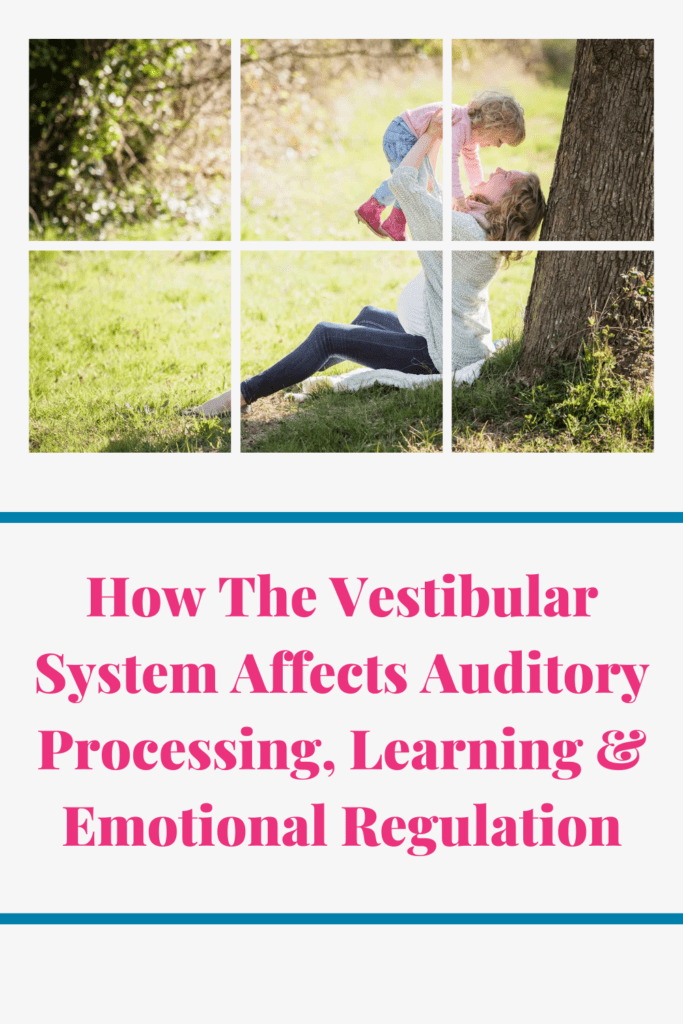Everyone thought Alicia was a drama queen and a ‘princess’. Not only did she avoid running, jumping and playing with the other kids, but she struggled with learning.
“She cries over the simplest things,” her mother remarked.”
Alicia hated being picked up, was afraid of the escalator and the stairs and avoided movement whenever she could.
Her mother thought gymnastics would be good for her but every time the instructor tried to coax her to do certain movements, Alicia screamed and cried.
Eventually, her mother gave up on taking Alicia to gymnastics. She came to me when Alicia’s learning was not progressing despite implementing an IEP and going to tutoring.
The Link Between Balance and Cognition
At first glance our sense of balance can feel like something very physical, that it’s a matter of muscles and joints. It can appear separate from auditory processing, but the vestibular and auditory system act as one.
The vestibular system activates and coordinates:
1) Motor movements
Motor movements and the postural muscles such as our core muscles help with focus, sitting still and eye stability.
2) The auditory system which encompasses so much more than simply hearing or even communication.
It also influences timing and the ability to sequence. Poor timing in the brain has been found to be weak in children with learning and reading difficulties. Timing of coordinated movements as well as timing of communication in the brain is critical for efficient processing of information.
Timing and sequencing is a part of optimal and efficient control of everything from the way the eye-muscles work as well as balance and coordination which ultimately affects cognition.
3) Provides a sense of gravity which helps to make us feel safe and grounded.
We all know impairments with balance can cause many of the symptoms that uniquely wired children struggle with: fatigue, vision problems, challenges with concentration, and nausea, motion sickness.
Mary Ann Watson and Owen Black go further into detail in The Vestibular Disorders Association, “Vestibular dysfunction as a cause of imbalance offers a particularly intricate challenge because of the vestibular system’s interaction with cognitive functioning.”
This is why improving vestibular function, coordination of movements as well as timing through such interventions as sound frequency therapy or interactive metronome can result in improvements with learning, behaviour and even mood and emotional response.
How a Weak Vestibular System Impacts Emotional Regulation
At first glance it can seem hard to believe that poor vestibular function could impact anxiety because we mostly think of anxiety as being limited to life events and bio-chemistry. These are factors that should be considered but vestibular function should be considered especially among children who have learning, reading or behaviour struggles.
Children with poor vestibular function may exhibit higher levels of anxiety, rigidity and may even appear controlling or socially anxious due to something called ‘gravitational security’.
This is the sense that tells us where the body is in relation to gravity. When it is strong, a person is able to predict when they will hit the ground.
Why Weighted Blankets Work
If this concept can seem far fetched that something like vestibular function can trigger a feeling of emotional insecurity, think of the calming effect that a weighted blanket has on both children and adults. The weight elicits a strong feeling of gravity, making it easier for these children to fall asleep because they feel safe and grounded.
Gravitational insecurity can create a fight-or-flight response in children from something as simple as being lifted off the ground. The inner ear’s over-responsiveness to vestibular sensations results in heightened anxiety, anger or emotions.
Drama Queen or Gravitational Insecurity?
This is different than sensory processing disorder because these kids are terrified of the sensation as opposed to being sensitive or irritated. What can seem like a simple activity or game to most, can result in a full on fight-or-flight response from these kids. To outsiders these kids might appear to be ‘babies’ or a ‘drama queen’.
Common Signs and Behaviours of Kids with Gravitational Insecurity are:
- Fear of heights
- Has an extreme emotional response to motion
- Feels vulnerable when feet are no longer on the ground
- Dislikes stairs, escalators, being up high on monkey bars,
- Dislikes swinging, jumping, being upside down
- Prone to motion sickness
Typically, when gravitational insecurity is the issue it is an indication that the vestibular system may be overdeveloped which can result in chronically high stress levels because of everyday triggers like walking to school, being on the bus, playing outside, using the stairs and other daily movements.
The Real Reason Why Some Kids Withdraw
As a result, these kids tend to be more sedentary and appear to have avoidant personalities especially when it comes to anything that involves motion.
Re-training the vestibular system and other sense organs can help these kids to more confidently go through life and enjoy the activities that are not only fun for other kids but can further promote brain development.
If you want to learn more about my coaching programs that help children move past limitations and rise above learning and behaviour difficulties–contact me for a free Clarity Call.
In Health & Wholeness,
Lorraine


